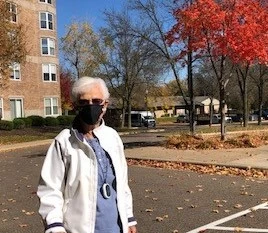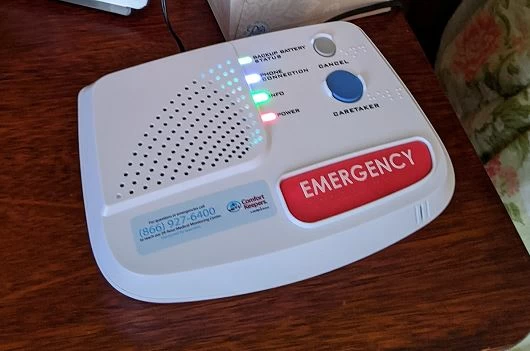Tips and Tools to Help Choose a Medical Alert System


Personal medical alert systems are designed to keep seniors safe and prevent life-threatening injuries from falls and other health emergencies that become more common when aging. Systems typically come with a base unit equipped with a help button and two-way speaker, and a wearable help pendant or bracelet.
During an emergency, all the user must do is press the help button on the base station or pendant and they’ll be connected to the company’s 24/7 monitoring center. A live operator will help the user get the assistance they need based on the situation, whether it’s a family member, neighbor, or first responder. If the operator is unable to get a response from the user, emergency help is immediately dispatched.
In 2020, RosePointe’s leadership and the Optimizing Aging in Place team chose to assist residents in making a transition from an existing and aged apartment-based Emergency Call System to more technologically advanced options for their continued protection and peace of mind.
We completed a resident needs assessment along with compiling research on Medical Alert Systems and delivered the following information to residents and their families for their consideration:
- A 2020 article written specifically as a Buyer’s Guide covering the main topics to consider when tailoring a Medical Alert System to user needs
- A 2020 research study on the top 10 Medical Alert Systems
- A process to meet RosePointe’s transition timeline for system installation, utilizing Comfort Keepers, a home-health care agency who partners with RosePointe to deliver personal resident services and also represents the Guardian Medical Alert system (selected as the #1 system in the study below).
Medical Alert System Buying Guide
There are several types of medical alert systems tailored to meet the needs of different users and the following topics highlight what you need to consider when evaluating your options:
- Landline vs. Cellular Systems?
- In-home alert systems will either run on a landline or cellular connection.
- Pendants, Smartwatches, or Portable Base Stations?
- If you want a system that can be used on the go, you’ll need to decide how you want to carry or wear the system.
- What is Automatic Fall Detection?
- Medical alert providers typically offer automatic fall detection pendants where the user won’t even have to press a button after a fall.
- How to Share Data with Caregivers and Family Members?
- Many providers offer companion mobile apps that pair up with your medical alert system.
- Typical Costs of a System?
- The most affordable systems start at around $20 per month and for on-the-go mobile systems between $30 to $45 per month.
- What Type of Maintenance is Required?
- Medical alert systems are built to be durable so maintenance is not typically required
The Best Medical Alert Systems of 2020

Editor in Chief of Seniorliving.org online magazine, Jeff Hoyt, and expert contributor, Linda Schlenker,worked over 200 hours with 5 expert consultants to research and evaluate 15 Medical Alert System products and selected their #1, #2 and #3 choices for the Best Medical Alert Systems of 2020* as:
- Guardian Medical
- Bay Alarm Medical
- Philips Lifeline
There are many options available and the choice is a personal one to be made by users and their families. RosePointe did not specifically recommend any particular service; however, they do have an existing relationship with Comfort Keepers, a home health care agency who is on-site at RosePointe 7 days per week in the a.m. and p.m., and, as a partner of Guardian Medical, could deliver a timely and cost-effective Medical Alert System solution in the following ways:
- Installing and training on the selected Guardian monitoring device
- Getting users set up with a “phone tree” to ensure the right people are contacted in an emergency
- Being an additional contact for users in an emergency. Their telephone support is available 24/7. RosePointe front desk may be the first call made by Comfort Keepers if requested.
- Being on-site at RosePointe 7 days per week 4 hours in the a.m. and 4 hours in the p.m. should a battery or unit replacement be required.
- Having a dedicated Customer Service Rep from Guardian to assist if additional support is required
- Providing follow-up support during their a.m. or p.m. shifts should the specific emergency require ongoing care
Solution review and implementation processes will differ from person to person and community to community, so having learned through our survey how many residents were satisfied using different alert systems, such as Bay Alarm and Philips Lifeline, they became referrals to residents requesting information on alternative solutions.
For more information regarding both the Best Medical Alert Systems of 2020 and a Medical Alert System Buying Guide please visit https://www.seniorliving.org/medical-alert-systems/best/
